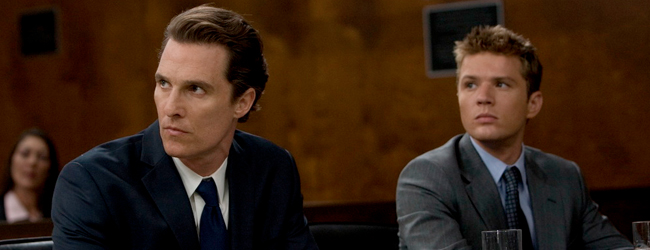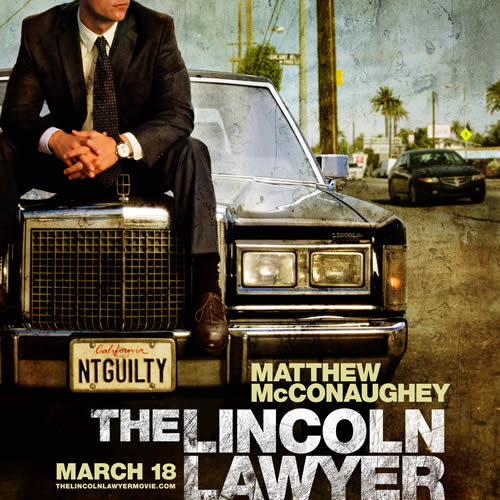
Opening and closing with a whole lotta soul (literally), The Lincoln Lawyer fills the middle with something that feels oddly archaic: courtroom drama. It’s been a good while since we’ve been entertained by slick lawyers. Blame it on the recession and a general dislike for those in expensive suits, blame it on Hollywood’s (and the public’s) fascination with toys and superheroes above all else, blame it on whatever you’d like, it feels strange when the most recent courtroom drama that garnered satisfactory reviews is Gregory Hoblit’s just-okay Fracture. Sure, one can make the argument that The Social Network counts, but recall that the lawyers were not the stars of that one. Here they’re front and center.
Directed by Brad Furman and starring Matthew McConaughey in a role our good Creator bore him to play, The Lincoln Lawyer tells of Mickey Haller (McConaughey), a fast-talking defense lawyer who does the majority of his work out of the backseat of his Lincoln Continental, making plea deals and literally picking up new clients off of the streets.
It’s a dirty job, but somebody’s got to do it, and get paid for it, is the philosophy of Mr. Haller. Or so he says. Deep down Haller’s a softie, a caring father, even a caring ex-husband. He and his ex-wife (a brief, underwhelming Marisa Tomei), who works for the state prosecution, have the sort of post-marital relationship most psychiatrists wish they could deliver.
Thanks to a peppy bail bondsman (John Leguizamo), Haller lands a moneymaker of a case: a rich real estate mogul’s son (Ryan Philippe) has been arrested for assaulting a young woman. Only something doesn’t smell right about the case, as Haller’s investigator, and the film’s comic relief (William H. Macy), points out. Sure enough, there’s a slew of bad smells about to rise to the surface. In fact, one of the primary reasons this film succeeds the way it does is its endless plot and breakneck pacing. Everything keeps twisting and rolling at a clip that will allow most watching to forget the abundant lack of characterization we’re receiving. There’s also McConaughey’s charming performance, recalling past years where critics and gossip columnists alike were deeming him “the next [insert great actor’s name here].”
This is the actor’s show, and the rest of the cast coalesces to his presence, save Philippe, who’s meant to go toe-to-toe with McConaughey from time to time. The young actor does his best, but never quite transforms into the vigorous man the script (written by John Romano, adapted from Michael Connelly’s novel) requires him to be.
Furman’s direction is stylish, employing a bright color template, constant over-exposure and a camera that never stops moving to move his story along. The lens focus goes in then out and the camera jumps from right to left without so much as a fair warning. Oddly enough, the audio on display is some of the sloppiest to come around the studio mill in some time. Foley noise distracts pieces of scenes, disappearing from splice to splice. If the post-production was rushed on this production, the visuals say nothing of it while the sound says more than enough.
Nevertheless, this is more studio entertainment than the film business has been known to offer over the last few years, making The Lincoln Lawyer something of a gem.


